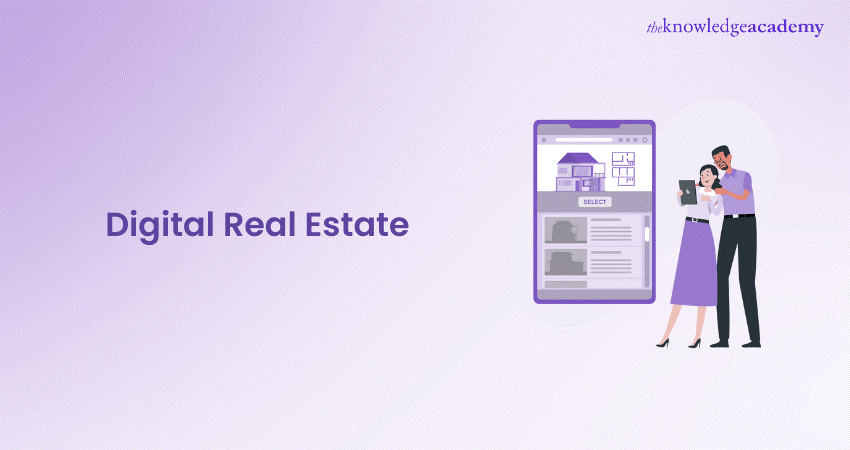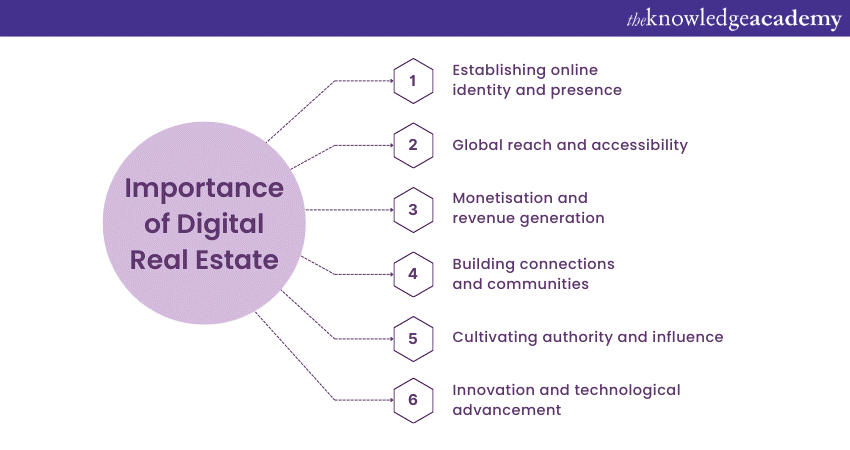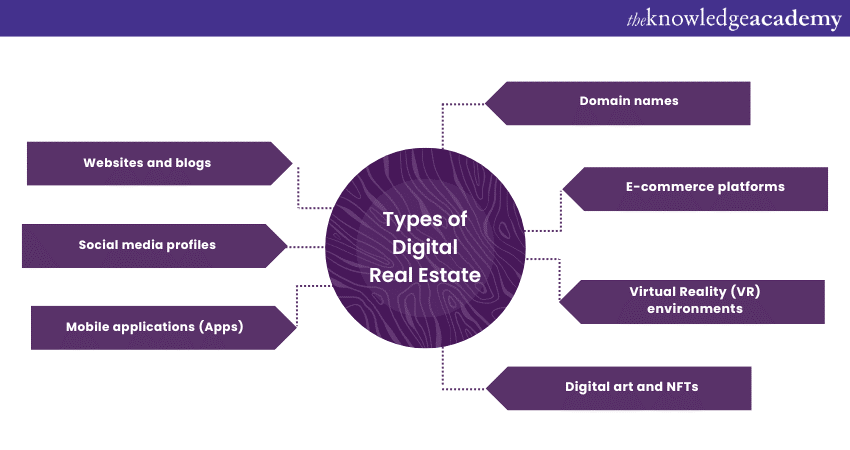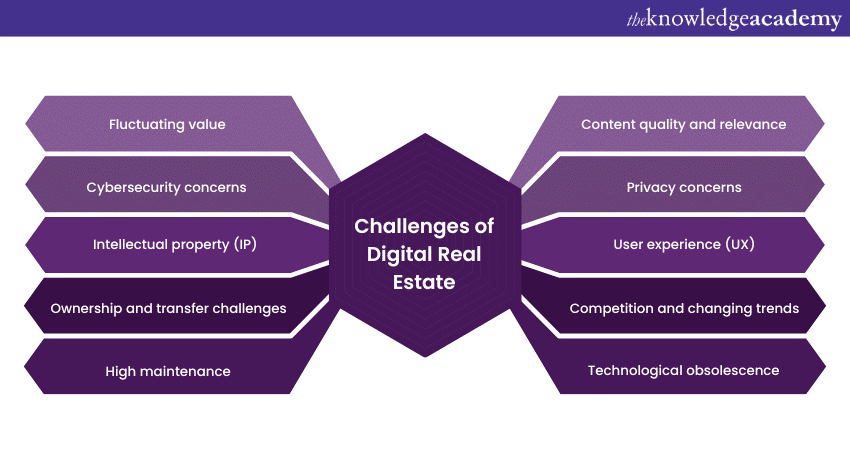We may not have the course you’re looking for. If you enquire or give us a call on +36 18508731 and speak to our training experts, we may still be able to help with your training requirements.
We ensure quality, budget-alignment, and timely delivery by our expert instructors.

Imagine owning a piece of asset over the internet where you can create, connect, and profit from your online presence. That’s what Digital Real Estate is all about. It’s the virtual land where web activities happen, from shopping to socialising, blogging to branding.
But do you know how to get started with Digital Real Estate? How to make it work for you? Most importantly, what are the trends and opportunities in this fast-growing field? In our blog, we will answer these questions. Explore Real Estate and discover market trends, investment strategies, and key considerations for success. Read now to learn more!
Table of Contents
1) Understanding What is Digital Real Estate
2) How can Digital Real Estate be used?
3) The importance of Digital Real Estate
4) Types of Digital Real Estates
5) Challenges and considerations in Digital Real Estate
6) Conclusion
Understanding What is Digital Real Estate
Just like how houses and shops stand on physical land, websites, apps, and even social media accounts exist on a virtual land called Digital Real Estate. These things can have a lot of value because they help people find what they need on the Internet.
What's truly fascinating about Digital Real Estate is that it's not restricted by physical limitations. In the real world, there's only so much space to go around, and it's a finite resource. But in the digital world, there's always room to expand, innovate, and experiment. You can renovate your digital storefront, add new rooms, change the layout, and even relocate to a bigger and better spot—all with just a few clicks.
How can Digital Real Estate be used?
Digital Real Estate is the online space where you can create, connect, and profit from your web presence. It encompasses various forms, including websites, blogs, social media pages, e-commerce platforms, and more. With the integration of Real Estate Software, managing and optimizing these digital assets becomes more efficient. Digital Real Estate also presents numerous opportunities, especially in the emerging metaverse, where you can engage and interact with others in a virtual world. Some of the ways you can utilize Digital Real Estate are as follows:
a) Advertising: You can sell ad space on your online property to other businesses that want to reach a vast audience. It can generate passive income for you while also providing value to your visitors.
b) Renting: You can rent out parts of your online space to other users who want to set up their own shops, services, or events. It can create a vibrant and diverse community on your site while also earning you a commission.
c) Replicating: You can create digital twins of your physical business locations, such as offices, stores, or factories. It can help you conduct meetings, showcase your products, or train your staff in a virtual environment.
d) Branding: You can use your online space to create immersive and engaging experiences that reflect your brand identity and values. It can help you attract and retain customers, as well as build loyalty and trust.
e) Selling: You can use your online space to sell digital goods, such as clothing, accessories, or art for avatars. You can use Non-Fungible Tokens (NFTs) to ensure the authenticity and uniqueness of your items and tap into a new market of online consumers.
The importance of Digital Real Estate
The online space is where you can create your identity, connect with your audience, and conduct your activities. It is as important as your physical location, if not more. That’s why you need to secure valuable Digital Real Estate in the digital age. The following are some other reasons why you should have an estate online:

Establishing online identity and presence
Your website or social media profile is your virtual storefront, where you can showcase your products or services and attract customers. Digital Real Estate allows you to build a powerful online identity that reflects who you are and what you do.
Global reach and accessibility
Digital Real Estate enables you to overcome geographical limitations and access anyone, anywhere, anytime. This allows you to expand your market, reach new customers, and interact with diverse audiences.
Monetisation and revenue generation
Digital Real Estate opens up possibilities for monetisation and income generation. You can earn money from your website traffic through ads and Affiliate Marketing, much like in Wholesale Real Estate, where investors generate profits through quick transactions and property deals. You can sell your products or services online through e-commerce platforms. You can offer paid services or in-app purchases through mobile apps.
Building connections and communities
Digital Real Estate fosters connections and community building. You can communicate with your audience, share your content, address their concerns, and create a sense of belonging. You can also create meaningful interactions that transcend physical and cultural barriers.
Cultivating authority and influence
Digital Real Estate provides a platform for you to demonstrate your authority and influence in your niche. You can share your valuable content, expertise, and insights through blogs, videos, or social media. You can position yourself as a thought leader, and build credibility and trust among your audience.
Innovation and technological advancement
Digital Real Estate is evolving with technological innovations. New forms of online spaces are emerging, such as Virtual Reality (VR) or augmented reality. These innovations can enhance the possibilities of digital interaction and enable immersive and engaging experiences.
Learn how to mitigate Real Estate risks effectively by signing up for our comprehensive Real Estate Risk Management Training today!
Types of Digital Real Estates
From domain names to Virtual Reality spaces, digital assets play a crucial role in shaping online interactions, commerce, and communication. So, let’s explore various types of Digital Real Estate:

Websites and blogs
Websites and blogs are fundamental forms of Digital Real Estate. Websites are online destinations that provide information, services, and products. They serve as digital storefronts for businesses and individuals, offering a platform to showcase content, products, and ideas. Blogs, on the other hand, are spaces for sharing thoughts, insights, and stories. Blogs are often created by individuals with expertise in various fields.
Social media profiles
Social media platforms offer spaces for users to create profiles and interact with others. These profiles function as Digital Real Estate where individuals, brands, and businesses can engage with their audience, and build communities. Social media profiles have become essential for establishing an online presence and promoting connections.
Mobile applications
Mobile applications, commonly known as apps, are software programs designed for smartphones and other mobile devices. They provide specific functions, ranging from communication and entertainment to productivity and utility. Apps offer users an easy way to perform tasks and access services on-the-go.
Domain names
Domain names are unique addresses that help users locate websites on the internet. They serve as virtual real estate, providing an identifiable and memorable entry point to a website. Investing in digital real estate through domain names can play a crucial role in branding and navigation, contributing significantly to the overall online identity of businesses and individuals.
E-commerce platforms
E-commerce platforms are digital spaces where businesses can showcase and sell their products or services online. These platforms facilitate transactions, enabling customers to browse, select, and buy items from the comfort of their homes. E-commerce platforms have transformed the way businesses conduct commerce in the digital age.
Virtual Reality (VR) environments
VR environments create immersive digital spaces where users can interact with computer-generated simulations. VR spaces have applications in entertainment, education, training, and beyond. These environments offer users a unique form of Digital Real Estate, enabling them to explore and engage in a three-dimensional virtual world.
Digital art and NFTs
Digital art has gained prominence as a form of Digital Real Estate. Artists create digital artworks that can be bought, sold, and owned. NFTs have revolutionised digital art ownership, providing a secure and unique way to establish ownership and value for digital creations.
Improve your Investment skills by joining our Investment and Trading Training!
Challenges and considerations in Digital Real Estate
Let's explore some of the key challenges and considerations that individuals and businesses should be mindful of as they set to make a move in this dynamic area:

Fluctuating value
Just like the value of physical properties can change due to market trends, the value of Digital Real Estate can also be volatile. Trends, technology shifts, and changes in user behaviour can impact the worth of websites, apps, and other digital assets.
Cybersecurity concerns
As digital assets become more valuable, they also become potential targets for cyberattacks and data breaches. Protecting Digital Real Estate from hacking, unauthorised access, and other security threats is paramount to safeguarding sensitive information and maintaining trust.
Intellectual Property (IP) difficulties
Digital Real Estate, such as websites, apps, and content, often involves Intellectual Property considerations. Copyright, trademark, and ownership rights need to be carefully managed to avoid legal disputes and ensure that content and creations are used appropriately.
Ownership and transfer challenges
Transferring ownership of digital assets can be intricate. For example, transferring ownership of a domain name involves technical steps and adherence to domain registrar policies. When buying or selling websites or apps, proper agreements and due diligence are crucial to ensure a smooth transition.
High maintenance
Digital Real Estate requires ongoing maintenance to remain relevant and functional. Websites need updates to maintain security and User Experience (UX), while apps require regular updates to keep up with changing operating systems and technology standards.
Technological obsolescence
The fast-paced nature of technology means that digital assets can become obsolete quickly. Websites built on outdated platforms may lose functionality, and apps that aren't updated may become incompatible with new devices and software.
Competition and changing trends
The digital landscape is highly competitive and subject to rapid changes in user preferences and trends. Staying relevant requires businesses and individuals to continuously innovate, adapt, and align their Digital Real Estate with evolving market demands.
User Experience and engagement
The success of Digital Real Estate hinges on User Experience and engagement. If websites are slow to load, difficult to navigate, or lack engaging content, visitors are more likely to leave. Thus, ensuring a positive UX is important for retaining and attracting audiences.
Privacy concerns
With increased awareness about data privacy, users are becoming more conscious about how their information is collected and used. Businesses need to adhere to privacy regulations and transparently communicate how user data is managed on their Digital Real Estate.
Content quality and relevance
Content is the heart of Digital Real Estate. However, maintaining high-quality, relevant content that resonates with the target audience is an ongoing challenge. Regularly updating content to keep it fresh and engaging is essential for retaining user interest.
Master the Investment Techniques with our Real Estate Financial Modelling Training– sign up now!
Conclusion
Digital Real Estate has become an important part of our lives in this internet-driven world. It comes in various forms, like domain names and virtual reality spaces, and it offers chances for branding, making money, and expressing ourselves.
As the digital world keeps changing, one thing is sure: Digital Real Estate is a lively place that can change industries and show us new ways to see value on the Internet.
Unlock your Real Estate Agent potential with our Real Estate Agent Masterclass – sign up now!
Frequently Asked Questions
How do trends in technology and the online landscape impact the future of Digital Real Estate?

Technology and the online landscape are constantly evolving, creating new opportunities and challenges for Digital Real Estate. For example, Blockchain, Artificial Intelligence, and Virtual Reality are transforming the way people buy, sell, and interact with online properties. Digital Real Estate Investors need to stay updated and adapt to these changes to remain competitive and profitable.
What are the benefits of owning digital properties in terms of wealth creation and financial security?

Owning digital properties can offer several benefits, such as lower entry barriers, global reach, passive income potential, flexibility, and diversification. Digital properties can generate income from various sources, such as advertising, affiliate marketing, and selling products or services. They can also appreciate value over time, depending on the demand and popularity of the online space.
What are the other resources and offers provided by The Knowledge Academy?

The Knowledge Academy takes global learning to new heights, offering over 3,000 online courses across 490+ locations in 190+ countries. This expansive reach ensures accessibility and convenience for learners worldwide.
Alongside our diverse Online Course Catalogue, encompassing 19 major categories, we go the extra mile by providing a plethora of free educational Online Resources like News updates, Blogs, videos, webinars, and interview questions. Tailoring learning experiences further, professionals can maximise value with customisable Course Bundles of TKA.
What is Knowledge Pass, and how does it work?

The Knowledge Academy’s Knowledge Pass, a prepaid voucher, adds another layer of flexibility, allowing course bookings over a 12-month period. Join us on a journey where education knows no bounds.
What are related Investment and Trading Training and blogs provided by The Knowledge Academy?

The Knowledge Academy offers various Investment and Trading Training, including Real Estate Risk Management Training, Real Estate Financial Modelling Training etc. These courses cater to different skill levels, providing comprehensive insights into Types of Investments.
Our Business Skills blogs covers a range of topics related to Real Estate Financial Modelling Training, offering valuable resources, best practices, and industry insights. Whether you are a beginner or looking to advance your Business skills, The Knowledge Academy's diverse courses and informative blogs have you covered.
Upcoming Business Skills Resources Batches & Dates
Date
 Real Estate Agent Course
Real Estate Agent Course
Fri 21st Mar 2025
Fri 16th May 2025
Fri 18th Jul 2025
Fri 19th Sep 2025
Fri 21st Nov 2025






 Top Rated Course
Top Rated Course



 If you wish to make any changes to your course, please
If you wish to make any changes to your course, please


